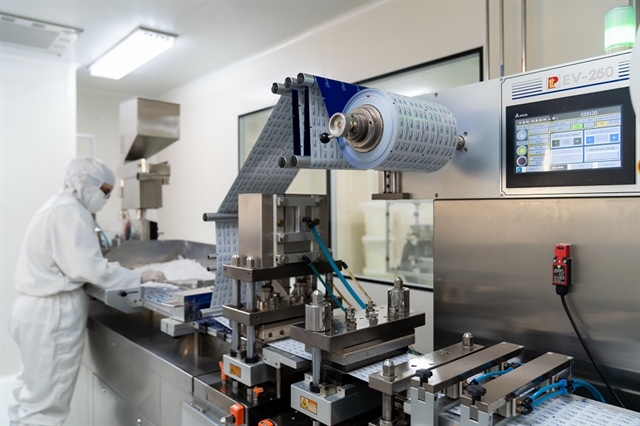 Economy
Economy

Rising demand is one of the reasons explaining many pharmaceutical companies' favourable business results.

|
| A worker at a drug production line of DHG Pharmaceutical. In 2022, the company's profit after tax grew 27 per cent over the previous year. Photo dhgpharma.com.vn |
HÀ NỘI — Last year, rising demand for drugs, especially antibiotic products and products for disease prevention and strengthening immune systems after the COVID-19 pandemic, contributed to the success of several pharmaceutical enterprises.
Particularly, OPC Pharmaceutical JSC set a record profit with a net profit of VNĐ142.4 billion (US$6 million) in 2022, a 15.4 per cent increase over the previous year. It has exceeded 2 per cent of the company’s revenue target and 3 per cent of its profit target for the year.
Imexpharm and DHG Pharmaceutical also reported a record profit after tax of VNĐ234 billion and VNĐ988 billion, respectively, with all exceeding their yearly plans.
Pharbaco is also one of the pharmaceutical enterprises that saw large profits last year when it posted a profit after tax of more than VNĐ62 billion, a gain of 125 per cent year-on-year and exceeding 15 per cent of the set plan. Meanwhile, Traphaco reported a net profit of VNĐ293.4 billion, up 11 per cent on-year.
Some other enterprises in the same industry that also recorded positive business results last year were SPM, Binh Dinh Pharmaceutical and Medical Equipment, CPC1, and Pharmedic, with profit growth of 12-29 per cent.
Higher demand for drugs is one of the reasons many pharmaceutical companies explain their favourable business results in 2022.
However, SSI Research said that the industry's growth will be capped this year and profits fall before gradually picking up. The pharmaceutical industry's revenue is still expected to increase by 8 per cent to VNĐ169 trillion in 2023.
The first half of 2023 will be an unpredictable period for the supply of active pharma ingredients (APIs) and excipients, as about 65 per cent of APIs used in drug production in Việt Nam are from China, which reopened last year, but shortages are still possible, SSI said.
In addition, as the war between Russia and Ukraine causes a risk of shortages of active ingredients and drugs imported from Europe, companies that can use domestic raw materials will gain a better position, typically TRA.
One of the year's standout stories, according to the analyst team, is the ongoing race for quality upgrades at major pharmaceutical companies.
Many companies, such as Traphaco, DHG Pharmaceutical, and Binh Dinh Pharmaceutical and Medical Equipment, are aiming to meet EU GMP standards for their production facilities. Products manufactured at a factory meeting EU GMP standards will be considered in the group of the highest-quality drugs in public hospital tenders.
Domestic companies hope to bid on products at higher prices than before but still lower than many imported drugs in this group. According to estimates by SSI Research, only 6 per cent of drugs in group 1 are produced domestically; the rest are mainly imported.
Upgrading to EU GMP will also help improve product quality and enhance competitiveness. SSI Research said that as of January, only eight Vietnamese companies owned production lines that met EU GMP or equivalent standards.
However, with high initial investment and maintenance costs, stringent requirements, and lengthy approval times, companies will have to consider pursuing this race or investing in other segments to get better profits.
On the stock market, Agriseco Research recommends investing in pharmaceutical stocks this year thanks to their defensive nature, stable business, and essential demand.
According to Fitch Solutions, it is forecasted that Vietnamese pharmaceutical industry revenue will grow steadily by 6.72 per cent in 2022–2026, boosted by growth in people's health spending. — VNS




